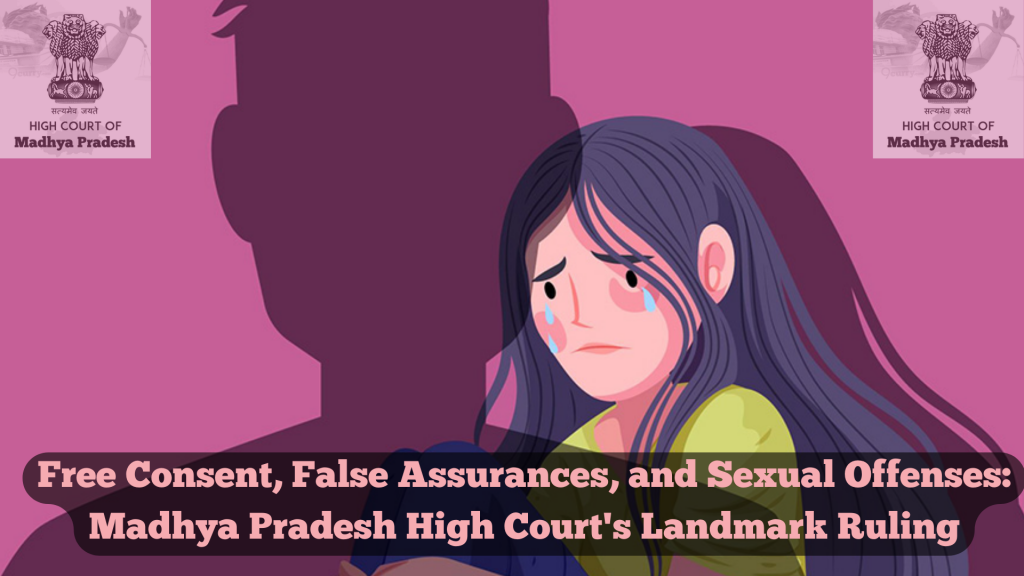
Free Consent, False Assurances, And Sexual Offenses: Madhya Pradesh High Court’s Landmark Ruling
Judgement Given On : 02/08/2021
In a significant legal development, the Madhya Pradesh High Court, in the case of Rajkishore Shrivastava vs. State of MP & Anr. on August 2, 2021, delivered an important judgment reaffirming the principle that consent obtained in consequence of any misconception or fear cannot be deemed as free consent. This ruling sheds light on the delicate balance between consent, false assurances, and sexual offenses in the realm of criminal law.
The case revolves around an FIR lodged by the prosecutrix, alleging sexual misconduct by the applicant (Rajkishore). According to her account, she began working as a receptionist at the applicant’s hospital in June 2020. Subsequently, the applicant left for Gwalior and Delhi and returned in July 2020. The prosecutrix accused the applicant of sexually violating her on multiple occasions, pressuring her to engage in sexual acts with other individuals, and terminating her employment when she refused. She further alleged that the applicant lured her with the promise of reemployment, subjecting her to sexual violations until December 2020, all while failing to fulfill his commitment. In response to her threat of informing the applicant’s wife, he retaliated by filing a complaint against her and resorting to physical violence.
The Madhya Pradesh High Court made several critical observations that bear significance in understanding the legal stance on consent in cases of sexual offenses:
- Misconception or Fear: The court unequivocally emphasized that if consent is given as a result of any misconception or fear, it cannot be considered free consent. This principle underscores the importance of ensuring that consent is genuinely voluntary, free from external pressures, and based on accurate information.
- Power Imbalance: The court acknowledged the power imbalance between the applicant and the prosecutrix due to their employer-employee relationship. This recognition underscores the vulnerability of individuals in subordinate positions and highlights the need for heightened scrutiny in cases involving such dynamics.
- False Promises: The court specifically noted that the applicant had obtained consent by making a false promise of reemployment. According to Section 90 of the Indian Penal Code (IPC), consent obtained under a misconception of fact is not considered valid consent. This section plays a pivotal role in cases where consent is obtained through deceit or false assurances.
Court’s Verdict
In light of the observations and legal principles discussed above, the Madhya Pradesh High Court dismissed the applicant’s plea. The court concluded that the consent obtained by the applicant under the false promise of reemployment constituted consent obtained under a misconception of fact, rendering it invalid.
It is important to note that the judgment aligns with the consensus of judicial opinion regarding consent in sexual offense cases. However, there is no one-size-fits-all formula for determining the voluntariness of consent. Each case must be evaluated based on its unique facts and circumstances. Moreover, the burden of proof lies with the prosecution, which must establish each element of the offense, including the absence of valid consent.
The Madhya Pradesh High Court’s ruling in the Rajkishore Shrivastava case reaffirms the legal principle that consent obtained through deception or fear is not genuine consent. This judgment serves as a reminder of the judiciary’s commitment to upholding the rights and dignity of individuals in cases involving sexual offenses. It underscores the importance of a comprehensive assessment of evidence and circumstances in determining the voluntariness of consent, ensuring that justice is served in accordance with the law.
